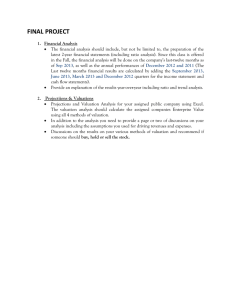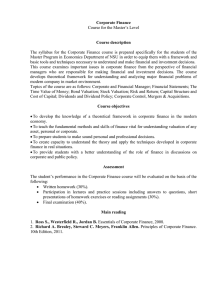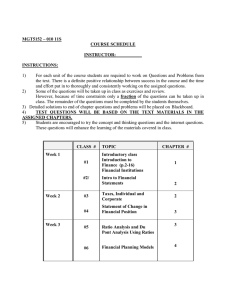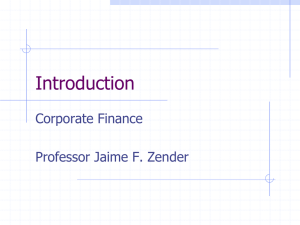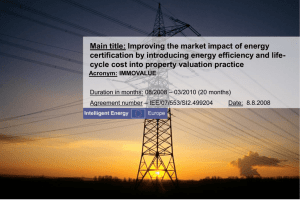Guidelines for evaluating overseas qualifications
advertisement
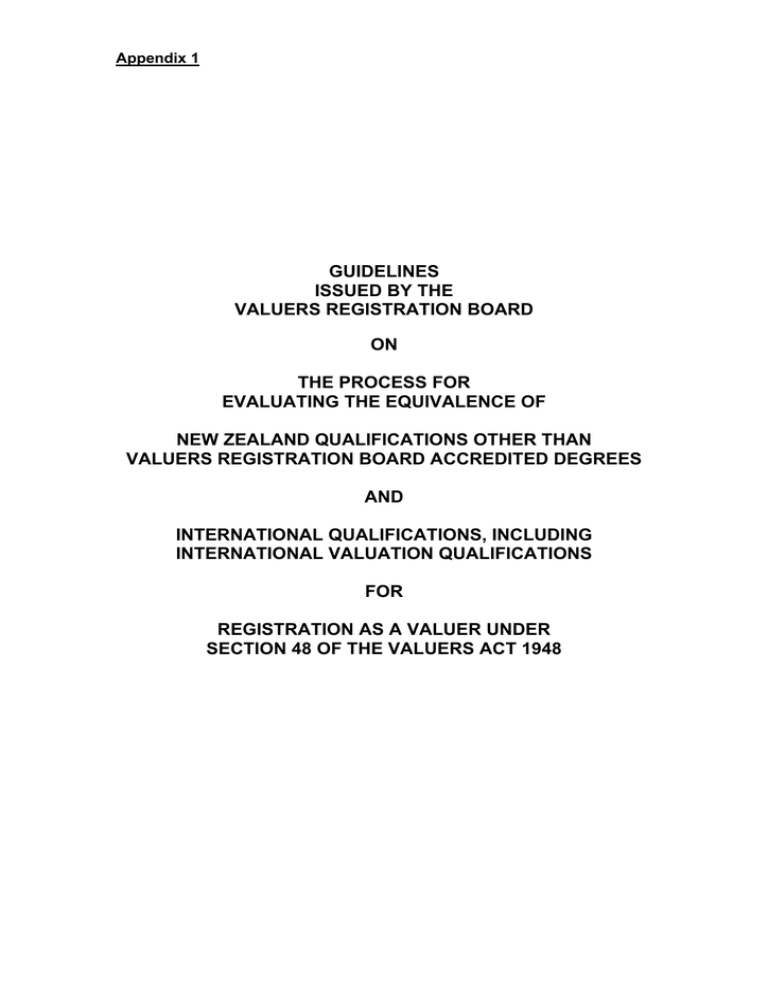
Appendix 1 GUIDELINES ISSUED BY THE VALUERS REGISTRATION BOARD ON THE PROCESS FOR EVALUATING THE EQUIVALENCE OF NEW ZEALAND QUALIFICATIONS OTHER THAN VALUERS REGISTRATION BOARD ACCREDITED DEGREES AND INTERNATIONAL QUALIFICATIONS, INCLUDING INTERNATIONAL VALUATION QUALIFICATIONS FOR REGISTRATION AS A VALUER UNDER SECTION 48 OF THE VALUERS ACT 1948 INTRODUCTION Section 19 of the Valuers Act 1948 states: (1) Every person who is not less than 23 years of age shall be entitled to be registered under this Act if they satisfy the Board they are of good character and reputation and have attained a reasonable standard of professional competence and that they – (a) hold a recognised certificate (as defined in subsection (2) of this section), and have had not less than 3 years’ practical experience in New Zealand in the valuing of land within the 10 years immediately preceding the making of their application, or (b) have passed an examination or examinations approved by the Board and have had not less than 3 years’ practical experience in New Zealand in the valuing of land within the 10 years immediately preceding the making of their application, or (c) hold a recognised certificate (as so defined) granted out of New Zealand, and have had not less than 3 years’ practical experience in the valuing of land within the 10 years immediately preceding the making of their application, of which at least 1 year shall be experience acquired in New Zealand within the previous 3 years, and have passed an examination approved by the Board in the valuation law of New Zealand and are at the date of their application, or were within the previous 12 months, members in good standing of an overseas institute or association of valuers with whom a reciprocity agreement has been entered into by the Board and that agreement is in full force and effect. (2) For the purposes of this section, the term ‘recognised certificate’ means a certificate, diploma, degree or licence granted by a university, college, board or other authority (whether in New Zealand or elsewhere) and recognised by the Board as furnishing sufficient evidence of the possession by the holder thereof of the requisite knowledge and skill for the efficient practice of the profession of land valuing. Background Paper The Valuers Registration Board (the Board) commissioned a paper on “Evaluating the Equivalence of International Valuation Qualifications” from Professor Terence Boyd of Queensland University of Technology. The initial report was received in March 2004 and following deliberation and further discussion, Professor Boyd provided supplementary notes and a process flow chart in November 2004. The Board is indebted to Professor Boyd for his detailed research that included a consideration of qualifications in Australia, the United Kingdom, Hong Kong, Singapore and South Africa. The Board consulted external bodies and grateful assistance is acknowledged to Auckland, Massey and Lincoln universities, the New Zealand Institute of Valuers and the New Zealand Property Institute for their input. The process 2 flow chart has been further adapted by the Board for this paper, retaining its key features of: - the evaluation of prior academic learning - a score awarded to determine additional education requirements for each individual - a transparent framework that is clear and simple to apply, understood by regulators, education providers and applicants - consistency across international boundaries - certainty of acceptance for registration as a valuer, subject to compliance with the practical experience requirements and passing an oral examination before the Board. Guidelines These guidelines set out the process that the Board uses when it considers applications from people with: a) New Zealand qualifications other than a Board-accredited Bachelor degree, and/or b) international qualifications, including international valuation qualifications. Each application will be considered on a case by case basis. The key components of the evaluation process, as outlined on the following page, should always be read in conjunction with the evaluation process flowchart. 3 KEY COMPONENTS OF THE EVALUATION PROCESS Because of the wide range of education qualifications of applicants, especially international applicants, it is not possible to provide a single academic pathway to registration. Accordingly the evaluation process assesses prior tertiary learning using a “scoring” scheme based on levels (from 1 to 4) and thereafter specifies the additional education requirements for each score. Several examples of tertiary qualifications for each score are provided below. Score 1: Any Diploma • An Australian TAFE (polytechnic) diploma in real estate • A UK based diploma course in management • An advanced diploma from Singapore in Construction Management Score 2: Any Bachelor or Masters Degree • Any overseas Bachelor or Masters Degree that receives NZQA equivalent rating. It can be from any country and cover any subject area (even unrelated to property studies) Score 3: Valuation Diploma • An advanced valuation diploma from Hong Kong Polytechnic University • An advanced valuation diploma from Sydney Institute of Technology, or other TAFEs, in Australia • The national diploma in valuation from a South African Technikons • A graduate diploma in surveying from a UK University • A valuation major from an international Bachelor of Technology degree (not accepted as Bachelor level in NZ) Score 4: Bachelor or Masters with Valuation Major • All degrees accredited by property institutes with Valuers Registration Board and New Zealand Institute of Valuers reciprocity agreements (e.g. Australian Universities accredited by API) • A Bachelor degree in Real Estate from Hong Kong University • A Masters degree in Real Estate from Pretoria University, South Africa • A Bachelor’s degree in Valuation from National University of Singapore • Bachelor or Masters degree in property from a European university, provided the degree is accepted for valuer registration or its equivalent in that country. The Valuers Registration Board does have reciprocal agreements with some countries which would enable an application for registration upon compliance with the relevant criterion. All applicants with overseas qualifications that are not eligible under reciprocity, must firstly forward details of their academic qualifications, including full course content, to the New Zealand Qualifications Authority (NZQA) for an assessment. The applicant should then liaise with the appropriate university to determine if any additional courses are required to obtain a qualification equivalent to a New Zealand undergraduate degree. 4 The NZQA assessment together with the recommendation by the university should then be forwarded to the Board for approval prior to commencing the proposed course of study. 5 EVALUATION PROCESS Are you a full member of a Valuation Association accredited by or having a reciprocal agreement with the Valuers Registration Board? (see note 1) Yes Standard Registration Process (see below) No Have you had your prior learning assessed by the New Zealand Qualifications Authority (NZQA) to check its status in New Zealand? (see note 2) No Ask NZQA to assess your prior learning. (see note 2) Yes Plan your additional learning requirements (see below) based on your NZQA assessment and send your plan and your NZQA assessment firstly to the appropriate university and then to the Valuers Registration Board for their prior approval before commencing further study / gaining NZ work Score 1: A diploma or advanced diploma (see note 3) Score 2a: A bachelors or masters degree, without a major in valuation. (see note 4) Score 2b: A bachelors or masters degree, with a major in law, finance, economics, town planning, resource management, civil / land engineering, or construction. Score 3: An advanced or graduate diploma in valuation. (see note 5) Score 4: A bachelors degree or masters degree with a valuation major. (see note 6) (see note 4) Based on your score above, you will need to complete the academic requirements shown in the relevant box below, as well as the practical requirements expected of all registration applicants. An approved university degree in property valuation from a NZ university. (see note 7) One to one and a half years full time equivalent university based valuation course, made up of the papers required for a ‘valuation major’ equivalent. (see note 8) One year full time equivalent university based valuation course, made up of the papers required for a ‘valuation major’ equivalent, while taking account of the applicant’s base degree. A half-year, to one year, full time equivalent university based valuation course, including a NZ property law paper. Has passed an examination approved by the Board, in the Valuation Law of New Zealand. (see note 9) (see note 8) Standard Registration Process. Applicants must: • hold a recognised certificate, (including a NZ Law Paper if applying under reciprocity) • meet the relevant practical experience requirements, • complete the necessary application form (including paying the required fees), and supply the required information (including academic record, sample reports, schedule of valuations etc), and • pass the Valuers Registration Board examination process. 6 Notes to be read in conjunction with above diagram: 1. International valuation associations accredited by, or having reciprocal agreements with the Valuers Registration Board include the Australian Property Institute (API), the Royal Institution of Chartered Surveyors Valuation Faculty (RICS) and the Singapore Institute of Surveyors and Valuers (SISV). 2. The Qualifications Evaluation Service of the New Zealand Qualifications Authority (NZQA) assesses the level of international qualifications in relation to the NZ Qualifications Framework. For more information refer www.nzqa.govt.nz. NZQA does not assess content of a qualification for acceptance by the Valuers Registration Board. 3. A diploma, or advanced diploma is defined, in this context, as a tertiary qualification of one or two years (full time duration). It includes graduate certificates and diplomas 4. A bachelor or masters degree is defined, in this context, as equivalent to a NZ Bachelor or Masters degree. A major in valuation is a degree with a minimum of 50% of the course content in valuation and valuation support subjects. 5. An advanced diploma in valuation is a tertiary course of a minimum duration of two years (full time) with at least 50% of the course content in valuation and valuation support subjects. A graduate diploma in valuation is a university-based course of a minimum duration of two semesters full time with at least 50% of the course content in valuation and valuation support subjects. Prior formal learning by way of an unrelated Bachelors Degree assessed as equivalent by NZQA. 6. A bachelor or masters degree with a valuation major is equivalent to a NZ Bachelor or Masters degree with a minimum of 50% of the course content in valuation and valuation support subjects. 7. A university degree in property valuation is a VRB accredited Bachelor degree which is currently offered at Auckland, Lincoln and Massey universities. The individual universities determine any credits that you may receive. 8. A one-year to one and a half-year (full time) university-based valuation course is a VRB accredited conversion course. It may form part of an undergraduate degree or be structured as a postgraduate diploma or advanced diploma or graduate diploma. The content of the course will be fully prescribed as valuation and valuation support subjects and the appropriateness of each conversion course will be considered by the VRB on a case by case basis. 9. A half-year to one-year (full time) university-based valuation course is a VRB accredited conversion course. It may form part of an undergraduate degree or be structured as a postgraduate certificate. The content of the course will be fully prescribed as valuation and valuation support subjects 7 and the appropriateness of each conversion course will be considered by the VRB on a case by case basis. 8 Additional Notes A. The additional study required to achieve a “recognised certificate” will take into account the prior learning and the proposed course of study. Accordingly, the Valuers Registration Board reserves the right of flexibility at levels “Score 2a” and “Score 3” to assess the additional study requirements in conjunction with the applicants chosen learning institution. B Workplace experience, “practical experience” outside New Zealand may be taken into account at the discretion of the Board provided it does not conflict with Section 19 and the applicant is able to demonstrate advanced learning at post-graduate level involving research and practical experience in a valuation course structure but in no event will this ‘credit’ for practical experience exceed six months. C Advanced learning at post-graduate level involving research and practical experience in a property course structure in New Zealand may be accepted as a ‘credit’ but in no event will this ‘credit’ for practical experience exceed six months. 9
